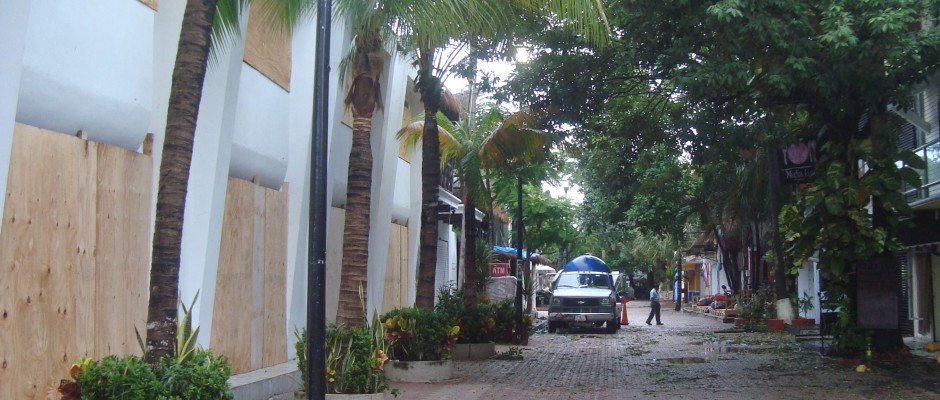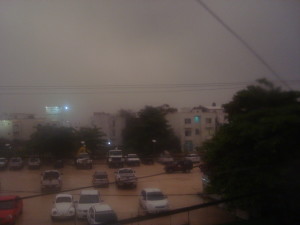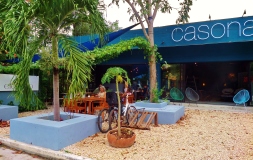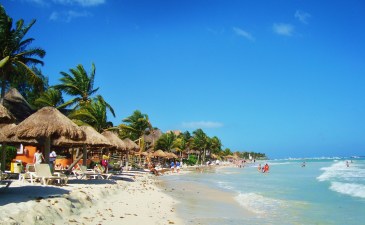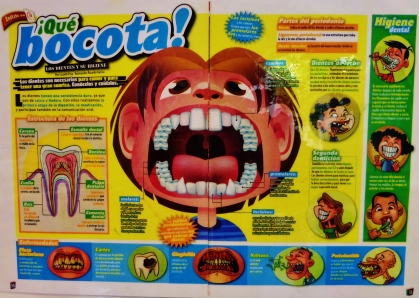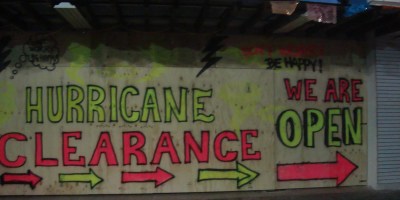
How to prepare for hurricanes
The biggest worry for homeowners and people living next to the warm ocean is a hurricane. People will no doubt remind you about hurricanes and the dangers when you move to Playa Del Carmen. The truth is, there is not too much to worry about due to the preparedness of the area and the infrequent event of a hurricane.
Unlike many places in the world, we have relatively few worries about natural disasters. We are do not have earthquakes, no mountain slides since we do not have mountains, only localized flooding since everything is flat, no snowstorms, only tornados associated with hurricanes, and no volcanos. We do have a dry season and there is the traditional way of clearing land with fire, which can get out of hand sometimes, but this is not a big concern. So basically, hurricanes are the only natural disaster we have to deal with.
Tourist here also do not have much to worry about because if a hurricane is imminent, large hotels will work to get as many people flown out of harm’s way and large hotels are prepared for such events. The worst thing that can happen is you have to cut your vacation short or move to another area while the storm passes.
Interesting fact: The word hurricane comes from the Caribbean cultures. “Huracan” was a Taino and Carib god and “hunraken” was the Mayan storm god.
The good news about hurricanes in Playa Del Carmen
The good thing about hurricanes is the advance warning you have and time to prepare. They are not sudden like earthquakes and often you have a week or more to prepare.
Cozumel buffers Playa Del Carmen from storm surges and takes a little strength out of storms. Cozumel however can get completely covered in water due to its flat surface and low elevation.
People have lived with hurricanes for centuries here and modern construction is mostly concrete. Basic construction can survive most storms. Most condos have hurricane shutters built into the building and other homes have metal bars on the windows that can act as a form of protection for your house during a hurricane.
Each large company here in the Yucatan Peninsula has to have a meeting with employees about the hurricane season and information is passed out. The state and local governments are very prepared for hurricanes and have plans in effect to deal with the aftermath. The government of Mexico also knows how important the Riviera Maya is for tourism and the amount of money it brings in, so things get cleaned up fast so traffic can flow, and tourists can return soon after a hurricane.
The below photo is what 5th Avenue looks like after a tropical storm. Not bad right? It was almost a Category 1 hurricane and only took off some branches.
Levels of storms
Tropical depression is a storm with circular motion that is somewhat organized and has maximum sustained winds under 63 km/h.
Tropical storm is when the system gets winds from 63 km/h and 118 km/h. It also gets a name at this stage in the alphabetical order of yearly storm names.
Hurricane is when the maximum sustained winds are 119 km/h or more and the storm has a defined storm center and low pressure.
So, do you really know what to do when a hurricane comes to Playa Del Carmen?
What do you need to do before during and after a big storm? Where do you go since everything is flat? What practical things can you have in your house that are good to have in Mexico? Here are some answers.
What to do before a hurricane in 14 tips
- Watch weather online to see if the storm is staying on track or intensifying. Most of the time you have at least 5 days to be alert to an approaching storm. Storms can change track in a matter of hours, so it is best to be on alert. Here are two good websites to check: National Hurricane Center (noaa.gov) and www.windy.com are both good places to check. Also get to know local sources of good information about the weather.
- Check your supplies at home. Fill your vehicle up with gas (when power goes out gas pumps don’t work or can run out). Have extra bottles of water and buckets for catching extra water for flushing toilets. Stock up on medicines and pet food. Have bleach on hand for sanitizing and cleaning up afterward. Have flashlights, candles, and lighters ready. Matches are ok but often can get humid and not work, so lighters are better. Sternos can be used for cooking if you have electric appliances in your place. Have extra cleaning supplies on hand for the cleanup.
- Take cash out of the bank because if the power is out for days, you cannot use an atm. Get small bills because change will be hard to get when paying for things. It can be days or over a week of no power for ATMs or empty ATMs after a storm.
- Put all important documents together in sealed plastic bags. This is important because if you have leaks or broken windows or if you need to leave your home, you have it safely packaged.
- Get stocked up on food that does not need to be cooked. Canned food, bags of refried beans, salsa, tortilla chips and things like these. Note: some things like Nissan noodle soups will actually mold in the container if stored too long. Be sure to check supplies before the storm. Plan on a week of food for home. Even if the storm passes relatively easily power might not be on right away and the supply chain to the supermarkets will be interrupted. Plan on using things in your freezer first if the power goes out or precooking things in your freezer so cooking is not an issue.
- Have a plan on where to go and know how to get there. If it is a big storm the evacuation zone might be big, and you might need to move hours away. If a large hurricane is coming to the peninsula, it often means leaving the peninsula since it can all be affected at once.
- Prepare the outside of your home. This can include caulking windows and checking for possible leaks. Often water enters places because of force and different angles of the rain. If you have palm trees you can brace or tie them to prevent them from toppling. To brace a tree, wrap it in fabric or rubber and then wrap rope or wires around and tie it off. The protective material keeps the tree from getting damaged with movement. Palm trees have very shallow roots, and those nice trees can be gone after one storm. Other trees you can trim to prevent high winds from damaging them or cut limbs that are close to your home. Bring in all outdoor furniture, trash cans and anything that can fly away. Turn off gas lines at the tank. This way if they get damaged you will prevent a leak. You can turn it back on after the storm.
- Go to your roof. Check your water tank and make sure the lid is on tight and check the construction around it, make sure it is strong. If you have a satellite dish, take it down. Tape cables together and check holes around air-conditioning connections to your interior. Use spray foam to fill gaps to prevent water from entering your house. Always maintain your roof with waterproof paint to protect your home from leaking especially during driving rain that can last for days. Check also your water tank (cistern) in the ground if you have one. If it is prone to flooding, then you can try to use sandbags to keep the water clean from flood waters. After all that is the water that is going to be pumped to your roof and then the water you will shower in. If flood waters get mixed with sewage it is not going to be good even though you are not drinking it. To understand your water system check out our article about how it works.
- If a smaller storm is imminent prepare your home. Covering windows with wood is not preferred here. It is hard to find plywood and also it can fly off in high winds and cause damage. If your home does not have storm shutters you can buy in advance fabric material that clips on the outside of your windows and acts as protection. It is a strong combination of fabric and carbon fiber that is easy to install and store when not in use. Tip: Have towel ready for leaks around windows. Also, for windows that can rattle or move some, have cardboard or something to keep the window from rattling in the wind.
- If your home is at a lower level, raise things up. Raise refrigerators up to prevent losing them. Make ice in your freezer in case the power goes out and you want to keep things cool. Usually, your refrigerator will keep things cool for 24 hours without electricity.
- Charge all your cell phones and computers in case the power is still off afterword and communication is working. Having some movies for watching can be good because if the power it out for days and you have nothing to do at night, this can be a good way to pass time. Have games on hand for children because they can get bored fast with no electricity.
- Don’t forget your car, park it on high ground. Many areas of Playa Del Carmen have slow drainage and areas can have flooding with just a big rainstorm let alone a hurricane. If you live near an above ground parking garage you might consider parking it there.
- Put food including pet food high off the floor in your home in case of flooding.
- Don’t forget to write down important phone numbers and have a map because GPS and or your cell phone might not work or you have a dead battery.
During a hurricane
This can be a half day up to a day of time waiting and staying inside.
 Watch water levels outside your home. The soil and ground here are not very absorbent and even in rainstorms water levels can rise fast.
Watch water levels outside your home. The soil and ground here are not very absorbent and even in rainstorms water levels can rise fast.- Drinking alcohol is a common thing during hurricanes, but you need to have your wits about you if you get in a dangerous situation.
- Keep appliances unplugged when at the height of the storm. Of course you want to use the refrigerator as much as possible.
- Don’t get fooled if the eye of hurricane passes over and it is calm. The winds can return quickly, and it will be in the opposite direction as before which is very damaging.
- Don’t leave your home until authorities have said it is ok to leave. Sometimes the other side of town can be in worse shape that where you are or there are dangerous power lines down.
- Do not walk around in your home by unprotected windows. Large windows can start to be stressed by high winds. Brace windows or support them internally, if possible, especially if unprotected from outside.
- If windows of doors get broken move to interior rooms and you can use mattresses for protection.
What to do after a hurricane
It can be another day of clouds and rain after a hurricane passes, so this often slows down the recovery. It often takes a full day or two to do cleanup after a decent sized hurricane.
- Keep informed by being connected to the internet or at least a radio.
- Take stock of your drinking water supplies and food supplies and don’t eat anything that is questionable. The last thing you want is getting a stomach flu when help is not available, or it is not possible to purchase medicine.
- Wear only sealed shoes outside to protect your feet from broken wood and nails. Many accidents come after a storm when there are more obstacles in the way of walking.
- Inspect your home for damage especially leaking gas lines.
- Check on your neighbors.
- If you can clear the street by your house to help emergency officials move through to help people.
- Make sure appliances are dry before plugging them in.
- Drain water from around your house to prevent mosquito breeding and spread of disease.
Should you buy a generator?
In short, no you don’t need to buy a generator. Why?
- Since most people live in condos, storage is one issue you might have with a generator.
- Some condos have storage, but then comes the issue of noise and using it after a hurricane. Generators are often very loud engines. Most people do not want to hear a generator going all day next to them.
- Often after a decent size hurricane, the power is out for two or three days. Yes, it can be boring, hot, and you will have a fridge of food going bad. But, with some preparation like planning what food to cook off and having battery powered fans around, you can survive just fine without a large investment in a generator.
We only recommend buying a generator if:
- you live in a house and have more space.
- you have a spare couple hundred to a thousand dollars to spend on one, and don’t mind using your purchase sparingly.
- you do not have a gas stove. A generator can help power something to cook food.
- you cannot live a few days without fans or air conditioning.
Note: The power in Playa Del Carmen usually goes out on average for three hours a month because of storms, maintenance or accidents. So outside of hurricanes, there is not much use for generators.
Evacuation shelters
What if your home is not good to be in or you need to evacuate? Most shelters are in schools and churches around Playa Del Carmen. Most have space from about 25-300 people so staying local is key. Really though, most shelters are for people living in very basic housing. The shelters are not the best hurricane shelters but will have some basic medical care and provisions.
Most large all-inclusive hotels will try to fly guest out of the area but in case they need to house guest they do have hurricane shelter availability. Most have space for 400-500 people.
If you want to see local shelter locations in Playa Del Carmen, you can see them on the official government website for Playa. http://www.solidaridad.gob.mx/
A large hurricane will make it necessary to evacuate hours away. There are limited option or cities to go to. Hotels will fill fast so planning on having your car filled with supplies because hotels will be limited, and you might need to sleep in your car. If possible, have friends you can stay with lined up that live far enough away. Remember there are not too many roads in the Yucatan Peninsula so options are limited to driving south to Chetumal or inland to Valladolid or Merida for example. Drive on highways only since these are less prone to flooding.
With a little luck we don’t have much to worry about and we will not have any big storms. Being prepared helps take some of the worry out living in the tropics and dealing with hurricanes. Preparation for a hurricane is just one small price to pay in order to live in such a beautiful place.
For more information on hurricanes in Playa Del Carmen you should also read our article about what the city does to prepare each year.


